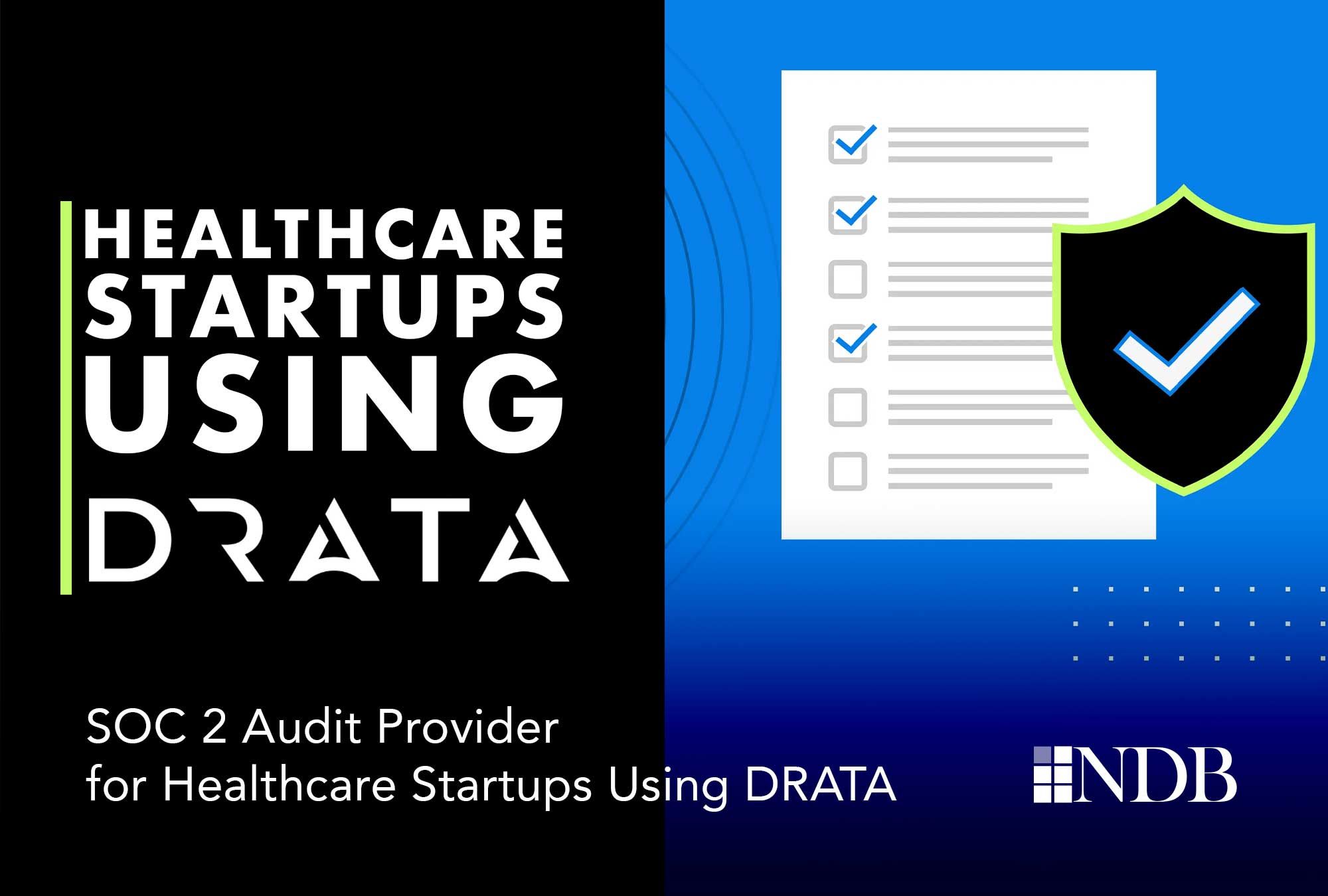For healthcare startups, data privacy and information security are not just operational necessities—they're business-critical. With increasing regulatory scrutiny, patient trust at stake, and a growing reliance on third-party services, achieving SOC 2 compliance has become a must for early-stage healthcare companies.
That’s where NDB steps in. As a trusted provider of SOC 2 Type 1 and Type 2 audits, we specialize in guiding healthcare startups through the entire compliance lifecycle. Leveraging Drata, one of the industry’s most advanced automated compliance platforms, we offer a phased, strategic approach tailored specifically for emerging healthcare companies.
From scoping and readiness to virtual compliance management, NDB has earned a reputation for delivering not just audits—but partnerships that help healthcare startups grow securely and confidently.
Understanding SOC 2 for Healthcare Startups
Before diving into our methodology, let’s quickly recap what SOC 2 compliance means for healthcare startups.
SOC 2 (System and Organization Controls 2) is a framework developed by the AICPA that evaluates how well a service organization manages data based on five Trust Services Criteria:
- Security
- Availability
- Processing Integrity
- Confidentiality
- Privacy
For healthcare startups handling protected health information (PHI) and other sensitive patient data, SOC 2 is often a prerequisite for partnerships, investor confidence, and customer acquisition.
Unlike one-time certifications, SOC 2 is a recurring process that evolves with your business. At NDB, we understand the unique demands on healthcare startups—and we’re here to simplify the journey.
NDB’s 5-Phase SOC 2 Compliance Process Using Drata
Our SOC 2 audit services are built around a five-phase framework, seamlessly integrated with Drata’s platform to automate and streamline compliance activities.
Phase I: Scoping and Readiness Assessment
Every SOC 2 journey should start with a solid foundation—and that’s exactly what we establish in Phase I.
We begin by conducting a comprehensive scoping exercise to determine:
- Which systems and processes fall under the audit scope
- The applicable Trust Services Criteria
- Key stakeholders, vendors, and integrations
- Potential gaps in your current security and compliance posture
For startup healthcare companies, we also evaluate specific factors like HIPAA alignment, cloud infrastructure (AWS, Azure, GCP), and data storage of electronic health records (EHRs).
The readiness assessment identifies:
- Existing controls that align with SOC 2 requirements
- Missing or weak controls that require remediation
- Opportunities to optimize controls using Drata
Deliverables in Phase I include a Readiness Report, Gap Analysis, and a customized Compliance Roadmap, giving you complete visibility before we engage Drata.
Phase II: Onboarding with Drata
As your trusted compliance partner, NDB ensures a smooth and efficient onboarding experience with Drata.
Drata automates many aspects of the SOC 2 process, including:
- Continuous control monitoring
- Evidence collection
- Vendor risk management
- Employee security training
- Policy management
NDB will:
- Configure your Drata instance for your specific business model
- Map your internal systems (e.g., Okta, Google Workspace, GitHub, AWS) to Drata
- Align your policies and procedures with the SOC 2 framework
- Train your team on how to use Drata to maintain compliance
Because we work closely with the Drata platform, our clients enjoy faster setup times, greater automation, and fewer headaches.
Phase III: Control Remediation and Optimization
Control gaps are common in early-stage companies—and fixing them correctly is critical for passing your audit.
In Phase III, we help you:
- Design and implement new controls to meet SOC 2 standards
- Strengthen existing controls using best practices
- Document policies and procedures aligned with both SOC 2 and HIPAA
- Automate control testing through Drata wherever possible
Typical control areas we assist with include:
- Access control and user provisioning
- Encryption and key management
- Incident response planning
- Vendor due diligence
- Employee security awareness
We also help create and tailor necessary documentation—like security policies, data classification guidelines, and breach response protocols.
Drata’s automation capabilities combined with our expert guidance drastically reduce manual effort and audit preparation time.
Phase IV: Performing the SOC 2 Audit
Once your environment is fully prepared, NDB performs your SOC 2 Type 1 or Type 2 audit in alignment with AICPA standards.
Type 1 audits evaluate the design of controls at a point in time, while Type 2 audits assess the operating effectiveness of those controls over a defined period (typically 3–12 months).
Why startups choose NDB for SOC 2 audits:
- We are licensed CPA auditors with deep experience in the healthcare sector
- We provide hands-on project management throughout the audit
- Our integrated use of Drata simplifies evidence collection and testing
- We communicate findings in plain English, not legal or technical jargon
- We help you turn your audit report into a sales and growth asset
After completing the audit, we deliver a final SOC 2 report that can be shared with investors, customers, and partners to demonstrate your compliance posture.
Phase V: Continuous Compliance Through Our Virtual Compliance Officer (VCO)
SOC 2 compliance doesn’t stop after the audit—and neither do we.
Our Virtual Compliance Officer (VCO) services provide ongoing compliance support, ensuring that you remain secure, audit-ready, and scalable as your startup grows.
VCO services include:
- Continuous monitoring of controls through Drata
- Quarterly control health checks
- Annual risk assessments and vendor reviews
- Policy updates and employee onboarding support
- Support for SOC 2 renewals and Type 2 follow-ups
- Preparation for HIPAA, HITRUST, or ISO 27001, if you decide to expand your certifications
Startups often lack the resources for a full-time compliance officer. With NDB’s VCO program, you get the expertise of a full compliance team—fractionally, flexibly, and affordably.
Why Healthcare Startups Choose NDB for SOC 2 Audits
Here’s what sets NDB apart:
- Deep industry specialization in healthcare startups
- Proven experience with SOC 2, HIPAA, and other compliance frameworks
- Official CPA firm performing SOC 2 Type 1 and Type 2 audits
- Strategic use of Drata to reduce audit time and resource drain
- Clear, collaborative, and educational approach
- Long-term partnerships through our VCO services
Whether you’re preparing for your first audit or scaling toward a Type 2 report, NDB provides a tailored, startup-friendly approach that delivers results without compromising agility or growth.
Let’s Get Started
If you're a startup healthcare company looking to achieve SOC 2 compliance with minimal friction and maximum value, NDB is ready to partner with you. From readiness to audit and beyond, we’ll guide you through every step—using Drata and our proven expertise to ensure a smooth, scalable, and secure compliance journey.




